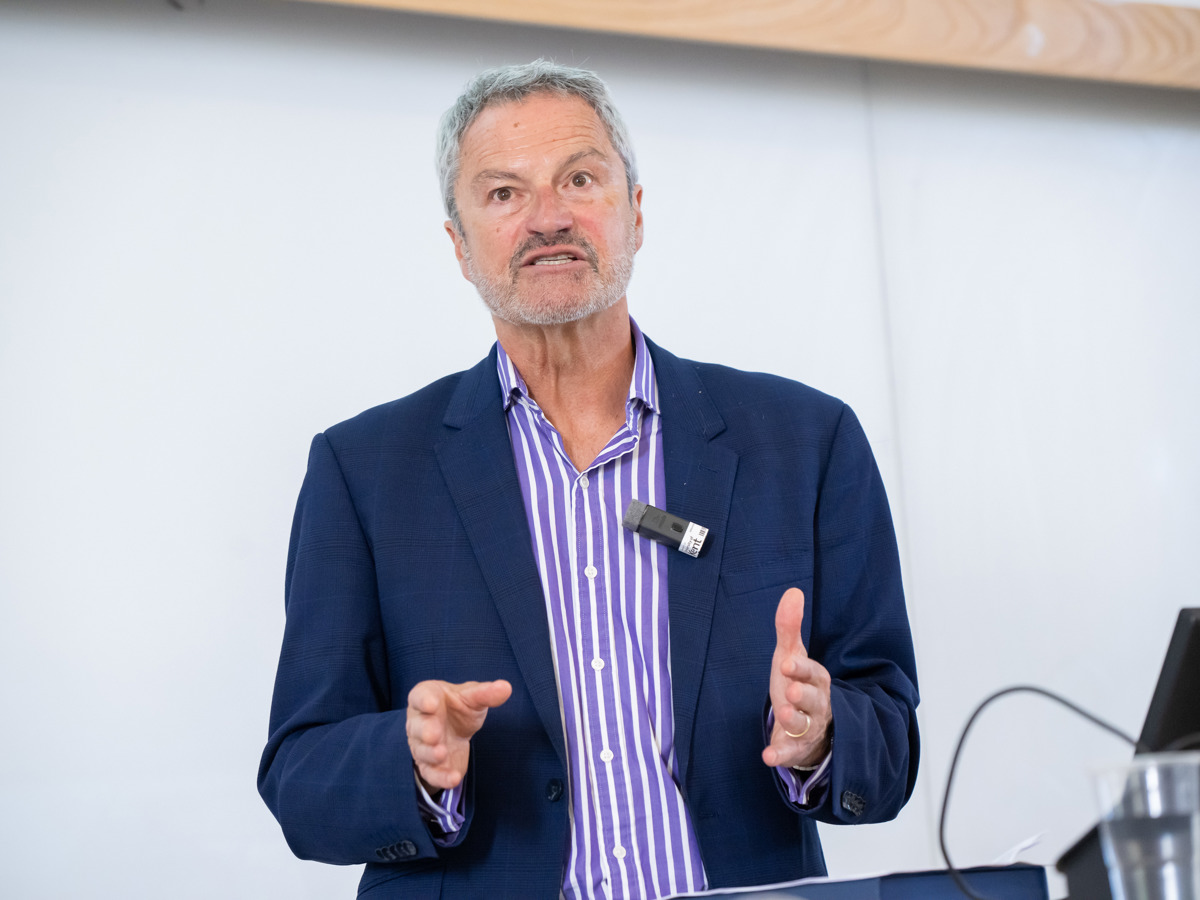
International students enrich our universities, culture and communities
July 03, 2024
About the author: Gavin Esler is a journalist and author, most recently of “Britain Is Better Than This”, a study of how to put the United Kingdom on a better path for the future. Earlier this year he concluded 10 years as Chancellor of the University of Kent.
Anyone connected with a British university is part of what I believe is the United Kingdom’s greatest export: our culture, in the widest possible sense.
English is the primary or secondary language of so many countries in the world, but more widely our cultural power is immense. Music? From The Beatles and Punk to Elton John to Adele - our great orchestras, the Proms, Andrew Lloyd Webber, the Royal Opera House, the Aldeburgh Festival and the Edinburgh Festival - the United Kingdom remains a cultural powerhouse. Then there are our writers in theatre, television, and cinema. The works of J.K Rowling and J.R.R Tolkien, along with the James Bond franchise, are not only wonderful novels, but they are also Hollywood hits.
And that brings us to our universities.
British Universities are and always have been a worldwide hit. Universities and education are a key part of Britain’s soft power, and so anything which damages universities damages all of us across Britain. For example, the University of Kent is one of the biggest employers in the county. When you add up the amount of money, jobs and opportunities in the university, plus ancillary and support services, then you understand that a university can bring prosperity and jobs.
I am ending my ten-year term as Chancellor of the University of Kent, and it has been one of the most wonderful experiences of my life. It has brought me great happiness to have joined hundreds of graduating students, the delight in the eyes of students when they receive their official degree is truly wonderful to behold. The University of Kent estimates that I shook at least 30,000 sets of hands of students from all over the world. Many students bring several family members to the graduation ceremonies, which means that on each occasion I am joined by thousands of happy people - a joyful corrective to our uncertain, difficult and often dangerous times.

Gavin Esler (author of Britain is Better Than This), Anne Marie Graham (Chief Executive, UKCISA), Lord Karan Bilimoria (President, UKCISA)
I was recently at a conference of some of the most powerful and skilled businesspeople from all over Europe, and their biggest concern was about a profound Europe-wide shortage of skilled labour. These hardheaded businesspeople were not talking in the language of “opening the floodgates” to migrants, they were talking instead about the need for controlled migration, education and training. The badly focused and, at times, hateful rhetoric about migrants causes many problems, including for those businesses we need to grow our economy.
Hostile rhetoric about foreign students and their families risks damaging our image abroad, our universities, and our great cultural power. It is self-harm.
A Turkish friend shared this piece of wisdom with me a couple of years ago. In Turkish history, July 1492 is famous. That’s the time of the expulsion of Jewish people from Spain, which came because of the Alhambra Decree. Sultan Bayed of the Ottoman Empire - a Muslim - could have “stopped the boats.” Instead, he welcomed Jewish migrants, who were refugees, to his Empire.
He then ridiculed the King of Spain, Ferdinand II, for his short-sighted policy of expulsion. The Sultan said to his courtiers, “You venture to call Ferdinand a wise ruler, - he who has impoverished his own country and enriched mine!” Sultan Bayed understood - as did the United States in much of the 19th and early 20th century, and the top businesspeople I was with recently - that a welcoming hand to people of talent, creativity and ideas is the mark of a wise ruler.
Those young people who come to the UK for an education obtain a university degree that will benefit them, and their home nation. They come to enrich themselves in many ways, but they also enrich our country. We thankfully remain the land of opportunity for some.
We need to humanise these discussions. We need to get away from numbers and statistics and tell human stories of success. Facts alone never cut through into most of our lives, but human stories do.
The United Kingdom, despite some of the political noise right now, has a long history of welcoming outsiders. It welcomed my ancestors, the Eslers, in the early 1600s when they, as Protestants, fled Germany’s 30 Years War. But in the past few years, the UK has demonstrated a history of short-sightedness. We sometimes place unnecessary barriers against people of talent, including those who come to our universities.
Despite all the turmoil of recent years, British culture remains a worldwide success. One university - Cambridge - has had more Nobel prize winners associated with it than any country in the world except the United States and Britain itself. The University of Kent, although very young, has already supported two Nobel prizewinners for literature: Kazuo Ishiguro and Emeritus Professor Abdulrazak Gurnah. They came from two different continents, two different cultures, and they have enriched Kent, the United Kingdom, and our lives.
In Britain, the government-inspired discussion about migration tends to focus on the very tiny group who risk their lives at sea, and then on foreign students and their dependents. Those of us who recognise that most foreign students return to their countries of origin also recognise that those who remain in the UK do so because they almost always enrich our country. I think we need to tell a better story.
We need to humanise these discussions. We need to get away from numbers and statistics and tell human stories of success. Facts alone never cut through into most of our lives, but human stories do.
So, here’s the challenge: instead of statistics, can we consider the success stories of individuals? What can be done to find and tell those stories better?
International students by definition are far from home. They need support and guidance, they enrich us, and we enrich them, they need an education, and we need them.
It has been my great pleasure to have engaged over the past few years in a charity tour of Europe alongside a young woman from Darfur, Emtithal (Emi) Mahmoud. She was a refugee from Sudan as a child, she managed to escape and made a life in the United States. Emi went to university and became the United Nations World Champion Slam Poet, a Goodwill Ambassador, and was honoured by Barack Obama.
As patron of the Kent Refugee Action Network, I met a young woman called Rishan. She came to England alone a few years ago when she was 17 years old. Rishan is now 26, and recently became a British citizen. Soon, she will graduate from Canterbury Christchurch University as a nurse.
We are short of qualified nurses in Britain, we are short of workers in many professions, and to fill those shortages we need ambitious hardworking young people. We also need properly funded universities with excellent teachers and other staff to help make their dreams happen.
And so finally I’d like to thank UKCISA and its members for the work they do.
International students by definition are far from home. They need support and guidance, they enrich us, and we enrich them, they need an education, and we need them. We need more Rishans, we need more Emis, and we need to be more vocal in telling stories that engage people.
This blog was written from a speech at the closing plenary of UKCISA Annual conference 2024 delivered by Gavin Esler.


